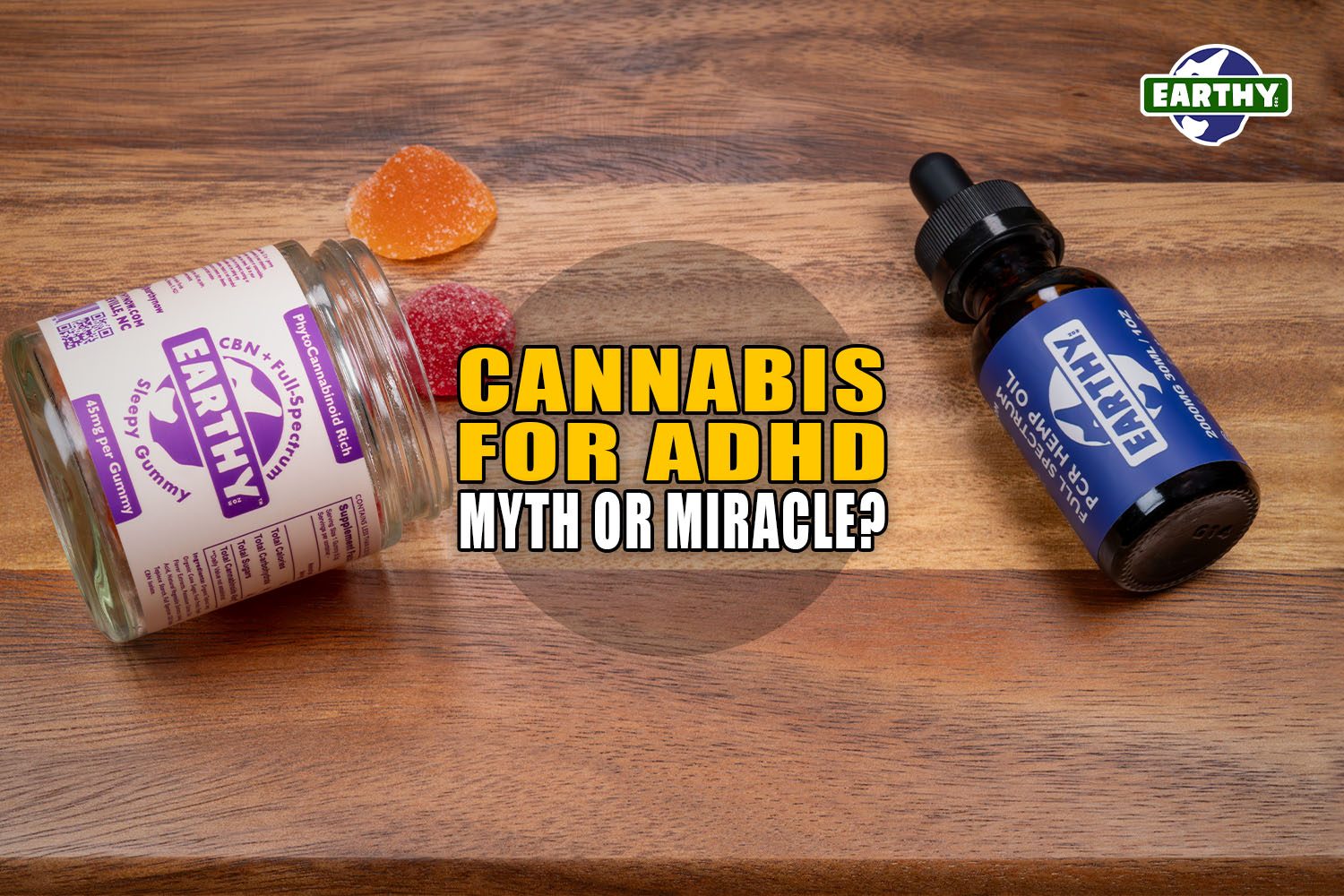Attention Deficit Hyperactivity Disorder (ADHD) is a neurodevelopmental condition affecting individuals globally, characterized by a spectrum of symptoms. For instance, many individuals with ADHD experience symptoms ranging from hyperactivity and impulsivity to trouble focusing on or completing tasks [1]. While conventional ADHD treatments, such as stimulant medications, have long dominated the therapeutic landscape, the emergence of cannabis as a potential alternative has sparked a flurry of debates and inquiries [2]. This comprehensive exploration aims to dissect the interplay between cannabis and ADHD, weighing evidence, clinical considerations, and ethical dilemmas.
Understanding ADHD and conventional treatments
ADHD often manifests early in childhood and may persist into adulthood, presenting challenges in various life domains. Mainstream treatments predominantly revolve around stimulant medications like methylphenidate and amphetamines, targeting symptom alleviation. However, concerns regarding efficacy, adverse effects, and the potential for substance use disorder highlight the need for alternative interventions [3].
Does Cannabis Affect Depression? Exploring Cannabis and Mental Health
Cannabis and its potential role in ADHD management
Derived from the cannabis sativa plant, cannabis harbors a myriad of active compounds, like THC and CBD, which interact with the body’s endocannabinoid system. The pharmacological effects of these cannabinoids are hypothesized to modulate neurotransmitter activity and inflammatory pathways [4]. Yet, untangling the nuanced effects of individual components and their dosages remains a formidable challenge. However, it has been suggested that cannabis may have a positive affect against the symptoms of ADHD. While this may be so for some, cannabis affects individuals differently, and studies are inconclusive [2]. Thus, individuals should seek the guidance of a healthcare professional before considering cannabis products for ADHD.
Cannabis and its components
Cannabis, derived from the Cannabis plant, contains numerous active compounds. These cannabinoids play a role in activating the endocannabinoid system, which regulates various physiological processes [4]. Though recent research suggests that cannabis may affect ADHD symptoms by modulating neurotransmitter activity, debate around this theory continues and research continues [2].
Understanding THC and CBD: The Key Components of Cannabis
What happens in the endocannabinoid system that affects mood and behavior?
When individuals consume cannabis, its active compounds, such as THC and CBD, interact with the endocannabinoid system (ECS) in the body. The ECS appears to play a crucial role in regulating various physiological processes or perceptions including mood, appetite, pain sensation, and memory. Upon consumption, THC binds to cannabinoid receptors in the brain, particularly CB1 receptors, triggering a cascade of neurochemical changes. Consequently, this interaction alters neurotransmitter release, leading to the modulation of neural circuits involved in mood regulation [4].
Sex and the Endocannabinoid System: Chemistry in the Bedroom
Research shows that THC’s psychoactive properties can induce feelings of euphoria or relaxation in some individuals, potentially impacting mood and subjective experiences. However, the effects of cannabis on mood can vary widely among individuals, influenced by factors such as dosage, method of consumption, and preexisting mental health conditions [5]. For people with ADHD, particularly adults seeking treatment, the interaction between cannabis and mood regulation remains a topic of interest, with online forum discussions and anecdotal reports highlighting the subjective experiences of cannabis users [6].
Menopause, Cannabis, and Sex Drive
Cannabis and anxiety
While some individuals report positive effects on mood with regular cannabis use, others may experience adverse outcomes, including increased anxiety or paranoia. Moreover, the interaction between cannabis and other substances, such as stimulant medications commonly prescribed for ADHD, poses additional risks [7]. Notably, the American Psychiatric Association (APA) recognizes the prevalence of substance use disorders among individuals with mental health conditions, including ADHD, underscoring the importance of comprehensive assessments in clinical practice [8]. Additionally, for school-aged children with childhood ADHD, the potential impact of cannabis on mood regulation and neurodevelopment remains a significant concern, given their heightened vulnerability to the psychoactive components of cannabis through smoking or other means. Thus, it’s crucial to keep cannabis away from children with or without ADHD [9].
Ultimately, understanding the interplay between cannabis consumption, mood regulation, and mental health outcomes is essential for healthcare providers and patients seeking treatment for various disorders. In populations with various ADHD symptoms and comorbid mental health conditions, advice from a medical professional is paramount.
How Does Cannabis Consumption Affect Your Brain and Cognitive Functions?
Regulatory landscape
The regulatory landscape surrounding cannabis is complex and multifaceted, particularly concerning its use in the context of ADHD treatment. While some regions have moved towards legalization for medical purposes, others maintain strict regulations influenced by concerns over potential cannabis use disorders or other issues[10]. This regulatory framework intersects with broader issues of mental health, drug and alcohol dependence, and the prevalence of comorbid mental disorders among individuals seeking treatment for ADHD. Notably, the APA’s Diagnostic and Statistical Manual delineates criteria for ADHD diagnoses yet excludes cannabis-related effects and their impact on ADHD.
Thus, for adults with ADHD, navigating the legal and therapeutic nuances of medical cannabis components presents challenges. This may become especially complicated in light of increased cannabis consumption and the potential for interactions with stimulant medications commonly prescribed for ADHD [2]. Additionally, the prevalence of recreational cannabis use among young adults and school-age children underscores the need for comprehensive regulations addressing cannabis consumption. particularly in vulnerable populations [9].
Can Legalization Lower the Carbon Footprint of Cannabis?
Evidence regarding cannabis for ADHD
Studies examining the effects of cannabis on ADHD symptoms have yielded mixed results. For example, some research suggests that cannabis use may elevate mood and creativity, while other findings conflict in their findings [2]. Ultimately, individuals with ADHD should follow the recommendations of a healthcare professional for safety and informed decision-making.
Earthy Now’s premium hemp and hemp-derived products
These premium hemp-derived products provide the industry’s cleanest and strongest CBD, CBN, CBG, CBC, CBDv, and CBDA products, with only trace amounts of Delta-9 THC (no more than 0.3%). As always, Earthy Now provides the perfect balance of cannabinoids while ensuring low Delta-9 THC levels per federal guidelines. Customers report various effects, from clear-headed alertness and energy to relaxation.
Earthy Now’s great line up of products:
Clinical considerations
The empirical landscape regarding cannabis for ADHD encompasses a diverse array of research methodologies, including systematic reviews, clinical trials, and qualitative analyses. While some studies suggest promising outcomes, others underscore potential risks, including increased risk of cannabis use disorder or cognitive impairment with heavy use. Moreover, anecdotal reports from medical cannabis patients and online forum discussions further underscore the heterogeneity of responses, necessitating personalized approaches to ADHD treatment [11].
Challenges and ethical dilemmas
Despite the potential uplifting and mood benefits, utilizing cannabis for ADHD presents a host of ethical dilemmas in certain communities. For example, issues such as standardized dosing and administration, the potential for cannabis dependence or drug abuse in the wrong hands, and the legal and social stigma surrounding its use present potential challenges. Moreover, navigating the regulatory landscape governing medical cannabis remains complex, with disparities in access, legality, and reimbursement policies [10].
Patient perspectives and holistic approaches
Understanding patient perspectives and preferences is paramount in shaping clinical practice and policy decisions surrounding cannabis use for any condition, including ADHD. Additionally, adopting a holistic approach to cannabis use that integrates empirical evidence, patient values, and ethical considerations is essential in optimizing outcomes and minimizing harm.
Conclusion: moving toward informed decision-making
In conclusion, the discourse surrounding cannabis for ADHD epitomizes the complexities inherent in mental health treatment. While research suggests medical marijuana has potential wellness benefits, substantial gaps in knowledge and ethical considerations persist. Moving forward, a concerted effort among researchers, clinicians, policymakers, and patients is imperative in navigating the evolving landscape of cannabis-based interventions for various ailments, including ADHD. By fostering informed decision-making and embracing a patient-centered approach, we can strive towards maximizing benefits and minimizing risks for individuals grappling with this multifaceted condition.
Visit Earthy Now and explore the exciting hemp-derived products to elevate your wellness!
Interested in wholesale cannabis? The Future of Hemp Flower Wholesale: Predictions and Trends
Medical Disclaimer / Legal Disclaimer – Information is provided for educational purposes. It does not and is not intended to constitute legal advice or medical advice. We attempt to be accurate and up-to-date, but the legality of cannabinoids and the science of cannabis are evolving. The author is neither a legal professional nor a medical expert. Before buying or using any products, you should check with your local authorities and medical providers.
References
- What is ADHD?
- Marijuana and ADHD
- ADHD Medication and Substance Abuse
- The Endocannabinoid System
- How Marijuana Affects the Body
- Self-Reported Effects of Cannabis on ADHD Symptoms, ADHD Medication Side Effects, and ADHD-Related Executive Dysfunction
- Befits and Risks of Cannabis and ADHD
- Attention Deficit Hyperactivity Disorder and Substance Use Disorders
- Adolescents and Marijuana
- Medical Cannabis State and Federal Regulations
- Marijuana and ADHD: What the Research Says
- Understanding the Difference Between CBD and THC




 Earthy Now
Earthy Now Earthy Now
Earthy Now